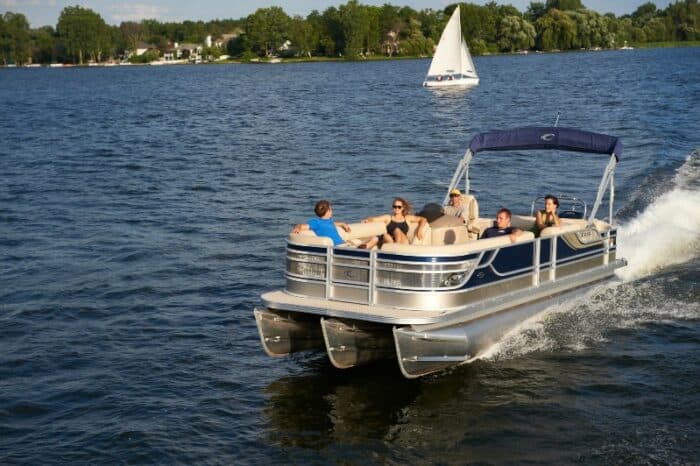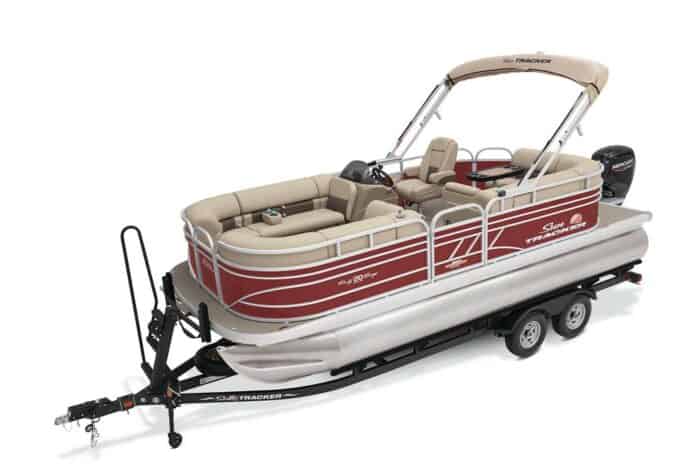How Much Does a Pontoon Boat Weigh?
Because pontoon boats can range in size from mini pontoons of around 8 feet by 4 feet all the way up to 30 foot pontoons, the average weight can be a little misleading unless you set some more strict rules for what you’re considering. If we ignore the mini pontoons and focus on medium sized pontoons, let’s say ones between 15 feet and maybe 28 feet, you’re looking at an average dry weight between 2,000 lbs and 3,000 lbs for most pontoon boats. Split the difference and say 2,500 lbs. Various additions and amenities can greatly alter your pontoon’s weight, as well. These extras, which include fuel and the passengers on board, are calculated as the wet weight which you can expect to start at around 4,000 lbs for most boats. These are traditional pontoons, of course, and an inflatable pontoon boat’s weight will be considerably less.
What Does a Pontoon Boat Weigh?
The weight of a pontoon boat is typically calculated to include everything from the tubes to the deck and the motor as well. That said, any cargo and passengers are obviously not calculated into the overall weight. If you’re factoring in the weight of a trailer in terms of towing capacity for your tow vehicle, then you definitely need to factor in the weight of the trailer, which likely averages around 1,200 lbs, as well as whatever gear and cargo is still on the boat when you trailer it.
Because pontoon boats can have a lot of variables in terms of what may be included in the boat ranging from bench seatings to all kinds of other amenities you may not be able to guess off the top of your head what any boat weighs without getting specs from the manufacturer. That said, you can use a very rough estimate about boat weights that says a pontoon weighs about 100 pounds per foot of boat length. For wider boats this might go up to 120 lbs per foot of boat length.
Based on that rough estimate, a 17 foot pontoon may weigh around 2000 pounds, which makes sense based on what we’ve seen already. A 30 foot pontoon would weigh up to 3600 lbs by this formula and that’s not unreasonable. A 28 foot Lowe SS270 pontoon has a dry hull weight of 3281 lbs. That said, a 28 foot Tahoe Vision Funship tips the scales at 4830 lbs. So the extra features on a pontoon, as opposed to just the overall length, have a massive effect on the weight.
Don’t forget, if you’re calculating weight for something like towing or weight capacity on the water that your fuel tank needs to be factored in. You can add about 7 lbs per gallon to the weight of your boat. The actual number is a bit less than that but it never hurts to overcompensate, just in case. So if you had a really big pontoon that had an 80 gallon fuel tank that’s full to capacity, then that’s an extra 560 lbs added to the overall weight of the vessel.
Your best bet for determining pontoon boat weights precisely is to head straight to the manufacturer. They should be able to give you the full specs of any pontoon including dry weight and maximum capacity. If you’re buying a used boat that’s a few years older you may need to do a bit of digging to determine the weight. In a real pinch, if you need to calculate the weight, you can take your boat on a trailer to a scale and have them weighed together then subtract the weight of your trailer to determine the overall boat weight.
Standard Weights for Pontoon Boats with Examples
Pond King makes a line of mini pontoons for fishing that are ideal for one or two people out on the water doing some fishing. They have no amenities at all and are powered by a trolling motor. The Pond King Sport has 12 foot pontoons, seating for two and weighs only 350 lbs.
The Lowe Ultra 162 Fish & Cruise can hold up to 8 people on board and has a dry weight of 1629 pounds at a length of 16 feet. That puts it in as an average small pontoon,for the most part. The weight lines up really nicely with the earlier formula of 100 lbs to every foot of boat length.
At 24 feet in length, an Avalon Catalina DRL tips the scales at only 2050 lbs which means it comes up short on that rule of thumb measurement by a fairly considerable amount. This is a medium sized pontoon and clearly it doesn’t have a lot of extra amenities weighing it down.
The Suntracker Regency 254XP3 clocks in at 27 feet in length and has a dry weight of about 3,300 lbs. This is a large pontoon and has some features on board that definitely bulk it up.
On the very far end of the scale if you’re looking at a massive pontoon, the 30 foot Bennington Marine 30 QX SB has a pair of twin 450 hp motors that factor into its impressive dry weight of 6801 lbs. That’s an absolute monster of a vessel and would require an equally large trailer to haul anywhere.
Factors that Affect Your Average Pontoon Boat Weight
There are a handful of things that pretty much every pontoon boat is going to have on board that are going to have a noticeable effect on the boat’s overall weight. One less common variable is the pontoon tubes themselves. Most pontoons are made of aluminum and boats traditionally have two of them. That said, you can also get tritoon boats that have a third pontoon tube in the center. Depending on the length of your boat, you can expect an additional pontoon tube to add perhaps 200 lbs or so to the total weight of the vessel. Perhaps not as much as you might think, thanks to how light aluminum is and the way tubes are constructed, but still a notable amount.
Fuel
As mentioned above, dry weight vs wet weight can have a big impact on what your pontoon boat weighs. We don’t always think of the potential weight increase of fuel on a boat but it definitely adds a lot. On average, new pontoon boats tend to have fuel tanks in the 20 gallon to 40 gallon range, meaning you’re adding about 140 lbs to 280 lbs of weight to your boat when you fill up. Most boaters also keep a small fuel reserve on board as well, maybe 10 gallons or less, but that would still be in the neighborhood of 70 extra pounds on board.
Seating
Leisure craft that include more seating for more passengers will also see an increase in weight thanks to the extra furnishings used to keep everyone comfortable. Some pontoons designed for longer stays and overnights have seats that may pull out to become beds and these can really increase your overall pontoon weight as well.
Deck Space
A standard pontoon width is about 8 feet but there are pontoon boats that may be 10 feet wide and 12 feet wide. The added width really throws off that 100 lbs per foot calculation since the width packs on the pounds per foot as well. Many larger pontoons have added width which is why you’ll see their weight numbers skewed so much away from that rugh formula, in addition to all the amenities they might feature.
Passengers
On the water this is vital to know but obviously will not factor into trailering the boat, or at least it shouldn’t. Generally it’s not a good idea to keep people on the boat when it’s on a trailer. That said, your passenger weight can be trickier to deal with than you’d think. Most pontoons have a max capacity limit that will be written on the boat and in your manual somewhere and will detail the exact weight limit of your boat. At the same time, it will also detail the maximum number of people that can be on board and the two numbers don’t always mesh. You have to remember that people can have drastically variable weights. A boat with a 10 person capacity that has 9 children under ten on board is not carrying the same weight as one that has 9 NFL linebackers on board. But the number of passengers limit should be respected above the listed weight capacity. That means if your boat can hold 3000 lbs but says only 8 people, and all 8 people weigh 150 lbs, don’t add more people to reach that weight limit.
Too many people on the deck of your boat can off balance it so that the weight distribution is off, even if you haven’t hit the weight capacity yet. Keep that in mind.
Cargo
Knowing what everything on your boat weighs is important because it can add up fast. And you might think your fishing gear and the radio and a depth finder all barely weigh anything, but when you add more and more and more stuff, when you have a cooler of drinks, and an anchor, and rope, maybe a winch and fire extinguishers and all that extra stuff, you’ll be adding hundreds of pounds without even realizing it.
It’s not unreasonable to expect that, on an average sized pontoon boat, you may be carrying around 500 lbs worth of gear with you when you head out on the water.
The Bottom Line
There are a lot of factors and variables that can change the calculations for what pontoon boats weigh but, in general you can figure that small to medium pontoons weigh about 100 to 120 lbs per foot of boat length. That factors to many boats weighing between 2000 and 2500 lbs. At the larger end of the scale, the additional amenities plus increased weight of large pontoons can throw this rough formula off and their final weights can be considerably higher than you might expect as a result.
When you’re figuring out your pontoon weight, either for max capacity on the water or because you plan to tow it with your trailer, don’t forget to include things like fuel, cargo and, on the water, passengers as well.
Categories: Pontoon Boats














